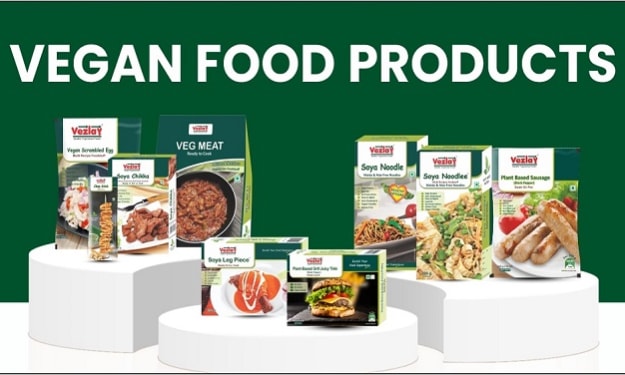The Future of Vegan Food: Innovations and Trends to Watch
Best Vegan Food

Introduction
Vegan Products has transitioned from a niche lifestyle choice to a mainstream movement. As more people embrace plant-based diets for health, ethical, and environmental reasons, the demand for innovative vegan food products has surged. This article explores the cutting-edge advancements and emerging trends in the world of vegan food, offering a glimpse into what the future holds for this dynamic and rapidly evolving sector.
The Growth of the Vegan Movement
Historical Perspective
The vegan movement has its roots in the early 20th century, but it wasn't until the latter half of the century that it began gaining significant traction. Early vegans were primarily motivated by animal rights, but the movement has since expanded to include concerns about health and environmental sustainability.
Current Statistics and Trends
Today, veganism is on the rise globally. According to recent studies, the number of people identifying as vegan has increased dramatically, particularly in urban areas. This growth is reflected in the market, with vegan food sales booming and vegan products becoming more readily available in mainstream supermarkets and restaurants.
Technological Advancements in Vegan Food
Plant-Based Meat Alternatives
One of the most exciting developments in vegan food is the creation of plant-based meat alternatives that mimic the taste, texture, and nutritional profile of animal meat. Companies like Beyond Meat and Impossible Foods have led the charge, using innovative ingredients and processing techniques to create products that are almost indistinguishable from real meat.
Lab-Grown Meat
Lab-grown meat, also known as cultured or cell-based meat, represents another frontier in vegan food technology. While not strictly vegan, as it originates from animal cells, it offers a cruelty-free and environmentally sustainable alternative to traditional meat production. This technology is still in its infancy but holds significant promise for the future.
3D-Printed Food
3D printing technology is also making waves in the food industry, allowing for the creation of intricate and customizable vegan food products. From 3D-printed plant-based steaks to complex confectioneries, this technology opens up new possibilities for vegan cuisine.
Sustainability and Environmental Impact
Reduced Carbon Footprint
One of the primary motivations for adopting a vegan diet is its lower environmental impact. Plant-based diets generally have a smaller carbon footprint compared to meat-heavy diets, contributing to reduced greenhouse gas emissions and less strain on natural resources.
Resource Efficiency
Vegan food production tends to be more resource-efficient, requiring less water and land than animal agriculture. This efficiency is crucial as the global population continues to grow and the demand for sustainable food sources increases.
Ethical Considerations
Ethical concerns about animal welfare are a significant driver behind the vegan movement. Innovations in vegan food technology help address these concerns by providing cruelty-free alternatives that do not involve the exploitation of animals.
Nutritional Improvements
Enhanced Nutritional Profiles
Modern vegan foods are not only designed to be delicious but also nutritionally balanced. Advances in food science have enabled the development of plant-based products that are rich in essential nutrients, such as protein, iron, and vitamins.
Fortified Vegan Foods
Fortification is a key trend in vegan food innovation, with many products now enriched with vitamins and minerals that may be lacking in a vegan diet. Examples include plant-based milks fortified with calcium and vitamin D, and vegan cereals enriched with B12.
Functional Foods and Superfoods
The inclusion of functional foods and superfoods in vegan diets is another exciting trend. Ingredients like quinoa, chia seeds, and spirulina are celebrated for their high nutritional value and health benefits, making them popular choices among health-conscious consumers.
Diverse and Exotic Ingredients
Ancient Grains and Superfoods
Ancient grains such as amaranth, teff, and farro are making a comeback, thanks to their impressive nutritional profiles and versatility in cooking. These grains offer a rich source of fiber, protein, and micronutrients, enhancing the health benefits of vegan meals.
Exotic Fruits and Vegetables
The use of exotic fruits and vegetables is expanding the flavor horizons of vegan cuisine. Ingredients like jackfruit, durian, and dragon fruit add unique tastes and textures to dishes, making vegan food more exciting and diverse.
Seaweed and Algae
Seaweed and algae are emerging as important ingredients in vegan food, valued for their nutritional density and sustainability. These marine plants are rich in vitamins, minerals, and antioxidants, making them a valuable addition to a balanced vegan diet.
Vegan Dairy Alternatives
Plant-Based Milk Evolution
The plant-based milk market has exploded in recent years, with a wide variety of options now available, including almond, soy, oat, and pea milk. These alternatives cater to different taste preferences and dietary needs, offering a versatile substitute for traditional dairy milk.
Vegan Cheese Innovations
Vegan cheese has come a long way from its humble beginnings. Today, there are countless varieties made from nuts, soy, and even root vegetables, each with its unique flavor and texture. Innovations in fermentation and aging processes have resulted in vegan cheeses that can rival their dairy counterparts.
Alternatives to Eggs and Butter
Innovative alternatives to eggs and butter are also gaining popularity. Products like aquafaba (the liquid from cooked chickpeas) and flaxseed meal are used as egg substitutes in baking, while plant-based butters made from oils and nuts offer a creamy, spreadable alternative.
Convenience Foods and Ready Meals
Growth of Vegan Fast Food
Vegan fast food is no longer a rarity. Major fast-food chains have started offering plant-based options, making it easier for vegans to enjoy quick and convenient meals. This trend reflects the growing demand for accessible vegan food.
Ready-to-Eat Vegan Meals
The market for ready-to-eat vegan meals is also expanding. These products cater to busy individuals who want to maintain a plant-based diet without spending a lot of time on meal preparation. Options range from frozen dinners to pre-packaged salads and sandwiches.
Vegan Meal Kits
Vegan meal kits provide a convenient solution for those looking to cook plant-based meals at home. These kits come with pre-measured ingredients and easy-to-follow recipes, making it simple to prepare delicious and nutritious vegan dishes.
Cultural Adaptations
Vegan Versions of Traditional Dishes
Creating vegan versions of traditional dishes is a growing trend. From vegan sushi and tacos to plant-based curries and pasta, chefs are finding creative ways to adapt classic recipes to suit a vegan lifestyle without sacrificing flavor.
Regional Vegan Cuisines
Regional vegan cuisines are gaining recognition, showcasing the diversity and richness of plant-based foods around the world. For example, Mediterranean, Indian, and Middle Eastern cuisines offer a plethora of naturally vegan dishes.
Fusion Foods
Fusion foods that blend different culinary traditions are also popular. These innovative dishes combine flavors and techniques from various cultures, resulting in unique and exciting vegan creations.
Consumer Trends and Preferences
Health and Wellness Trends
Health and wellness trends are driving the popularity of veganism. Many consumers are turning to plant-based diets to improve their health, manage weight, and prevent chronic diseases. This focus on wellness is reflected in the increasing demand for nutritious and wholesome vegan products.
Ethical and Sustainable Consumption
Ethical and sustainable consumption is another major trend influencing consumer preferences. People are more conscious of the impact of their food choices on the environment and animal welfare, leading them to opt for vegan products that align with their values.
Rise of Flexitarians
Flexitarians, a diet that is primarily plant-based but occasionally includes meat and animal products, is on the rise. This trend reflects a growing interest in reducing meat consumption without committing to a fully vegan lifestyle. Flexitarians contribute to the demand for high-quality vegan products as part of their varied diet.
Restaurant and Food Service Industry
Vegan Restaurants and Menus
The number of vegan restaurants is increasing, offering dedicated plant-based menus that cater to vegans and curious omnivores alike. These establishments are pushing culinary boundaries and showcasing the potential of vegan cuisine.
Mainstream Adoption of Vegan Options
Mainstream restaurants are also incorporating vegan options into their menus. From fine dining to casual eateries, more chefs are recognizing the importance of offering plant-based dishes to meet the growing demand.
Food Delivery Services
Food delivery services are capitalizing on the vegan trend by offering a wide range of plant-based options. These services make it easy for consumers to enjoy vegan meals from the comfort of their homes, further expanding the accessibility of vegan food.
Packaging Innovations
Sustainable Packaging Solutions
As consumers become more environmentally conscious, the demand for sustainable packaging solutions is increasing. Many vegan food companies are adopting eco-friendly packaging materials, such as biodegradable plastics and recyclable containers.
Zero-Waste Initiatives
Zero-waste initiatives are gaining traction, encouraging both producers and consumers to minimize waste. These initiatives include bulk buying, reusable containers, and compostable packaging, all aimed at reducing the environmental impact of food packaging.
Edible Packaging
Edible packaging is an innovative solution to the problem of food waste. Companies are developing packaging made from edible materials like seaweed and rice paper, which can be consumed along with the food, eliminating waste altogether.
Influence of Social Media and Influencers
Role of Influencers in Promoting Veganism
Social media influencers play a significant role in promoting veganism. Through their platforms, they share recipes, product reviews, and lifestyle tips, inspiring their followers to adopt plant-based diets.
Social Media Trends and Challenges
Social media trends and challenges, such as "Meatless Mondays" and "Veganuary," encourage people to try veganism. These campaigns create a sense of community and make the transition to a plant-based diet more approachable.
Online Vegan Communities
Online vegan communities provide support and resources for those interested in veganism. These communities offer a space for sharing recipes, discussing challenges, and celebrating successes, fostering a sense of belonging among vegans.
Challenges and Controversies
Nutritional Deficiencies
One of the challenges of a vegan diet is ensuring adequate intake of certain nutrients, such as vitamin B12, iron, and omega-3 fatty acids. Addressing these potential deficiencies through fortified foods and supplements is crucial for maintaining health.
Accessibility and Affordability
Accessibility and affordability can also be barriers to adopting a vegan diet. While vegan food is becoming more available, it can still be expensive and harder to find in some areas. Efforts to make vegan options more affordable and accessible are essential for wider adoption.
Cultural Resistance and Misinformation
Cultural resistance and misinformation about veganism can also pose challenges. Misconceptions about the adequacy and palatability of vegan diets can deter people from trying plant-based options. Education and positive representation are key to overcoming these barriers.
Conclusion
The future of Vegan Food is bright, with continuous innovations and trends driving the movement forward. From technological advancements and sustainability efforts to cultural adaptations and consumer trends, the vegan food landscape is evolving rapidly. As we look ahead, it's clear that veganism will play an increasingly important role in our diets and our efforts to create a more sustainable and ethical food system.
About the Creator
Enjoyed the story? Support the Creator.
Subscribe for free to receive all their stories in your feed. You could also pledge your support or give them a one-off tip, letting them know you appreciate their work.





Comments
There are no comments for this story
Be the first to respond and start the conversation.